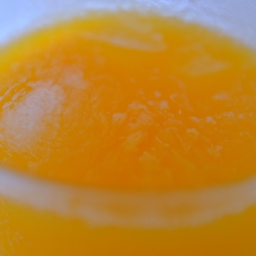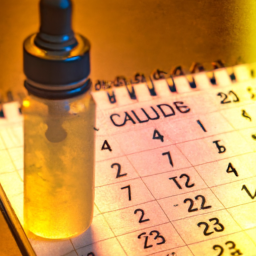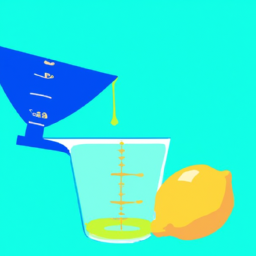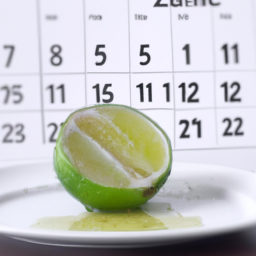Did you know that orange juice is one of the most popular morning beverages around the world? In fact, the average American consumes about 2.7 gallons of orange juice each year.
But have you ever wondered how long it takes for orange juice to go bad? As with any perishable food item, the shelf life of orange juice can vary depending on a variety of factors. From the type of orange juice to the storage techniques used, there are many variables that can impact the freshness and safety of this beloved beverage.
In this article, we will explore the different types of orange juice, the factors that affect its shelf life, and how to tell if your orange juice has gone bad. We will also discuss proper storage techniques and ways to extend the shelf life of your orange juice, as well as the potential health risks associated with consuming expired or spoiled orange juice.
So let’s dive in and learn more about the shelf life of orange juice!
Key Takeaways
- Proper storage methods are key in keeping orange juice fresh.
- Signs of spoilage include changes in color, texture, and taste.
- Refrigeration is the most effective method to extend the shelf life of orange juice.
- Always check expiration dates before buying and consuming orange juice.
Types of Orange Juice
You’re gonna love the different types of orange juice available, from freshly squeezed to frozen concentrate! When it comes to orange juice, there are two main types: fresh and concentrated.
Fresh orange juice is made by squeezing oranges. It can be made from organic or non-organic oranges and is available in both pulp and no-pulp varieties. It is often considered the healthier option as it contains more nutrients and is less processed.
Concentrated orange juice is made by removing the water content from oranges and then rehydrating it later. It is often cheaper and has a longer shelf life due to its processing method. It is also available in both organic and non-organic varieties.
Both types have their own unique set of pros and cons. Now, let’s explore the factors that affect orange juice shelf life.
Factors Affecting Orange Juice Shelf Life
Understanding the variables that impact the shelf life of orange juice can help you determine its freshness and quality. Factors affecting orange juice shelf life include packaging and temperature.
Orange juice packaged in glass bottles or tetra packs tend to last longer than those in plastic bottles. Glass and tetra packs have a lower rate of oxygen transmission, which slows down the oxidation process that leads to spoilage. On the other hand, plastic bottles have a higher oxygen transmission rate, which accelerates the oxidation process and shortens the shelf life of orange juice.
Temperature is another critical factor that affects the shelf life of orange juice. Storing orange juice at room temperature (around 20°C) increases the rate of microbial growth, which can cause spoilage. As a result, it’s best to keep orange juice in the refrigerator to slow down the growth of bacteria and fungi.
The optimal temperature range for storing orange juice is between 0°C to 4°C. By understanding these factors, you can ensure that your orange juice stays fresh for longer.
When it comes to fresh squeezed orange juice, the shelf life is even shorter than packaged orange juice. However, there are ways to extend its shelf life.
How Long Does Fresh Squeezed Orange Juice Last?
Freshly squeezed orange juice doesn’t last very long, but there are tricks to prolong its freshness. In fact, the shelf life of fresh squeezed orange juice depends on various factors such as temperature, light exposure, and the presence of air. According to the United States Department of Agriculture (USDA), fresh orange juice can last up to 2-3 days when stored in the refrigerator at 40°F or below. However, there are ways to preserve its freshness for a longer period, such as adding citric acid or ascorbic acid to the juice to prevent oxidation and using an airtight container to store it.
To further illustrate the benefits of fresh squeezed juice, let’s take a look at the table below. This table compares the nutritional value of freshly squeezed orange juice versus pasteurized orange juice, which we will discuss in the next section. As you can see, freshly squeezed orange juice contains higher amounts of vitamin C, folate, and potassium compared to its pasteurized counterpart. Additionally, it is free from added preservatives, which makes it a healthier option.
| Nutrient | Fresh Squeezed Orange Juice | Pasteurized Orange Juice |
|---|---|---|
| Vitamin C | 93.9 mg (156% DV) | 50.0 mg (83% DV) |
| Folate | 74.0 mcg (19% DV) | 45.0 mcg (11% DV) |
| Potassium | 496 mg (10% DV) | 450 mg (10% DV) |
As we have seen, fresh squeezed orange juice is a nutritious and delicious beverage. However, if you’re unable to consume it within a few days, pasteurized orange juice may be a more suitable option. So, how long does pasteurized orange juice last unopened? Let’s find out in the next section.
How Long Does Pasteurized Orange Juice Last Unopened?
If you’re planning on stocking up on store-bought orange juice, it’s important to know its shelf stability and expiration date. Pasteurized orange juice, which has undergone a heat treatment to kill bacteria, can last unopened for several weeks or even months, depending on the brand and storage conditions.
Here are some things to keep in mind:
- Keep the juice in a cool, dry place away from direct sunlight and heat sources.
- Check the expiration date before purchasing and choose the freshest bottle available.
- Look for indicators of spoilage such as off odor, mold, or a cloudy appearance.
- Once opened, the juice should be consumed within a week or two and stored in the refrigerator.
- Remember that the shelf life of orange juice can vary depending on factors such as preservatives and packaging.
Pasteurized orange juice can last unopened for a considerable amount of time, but once opened it should be consumed within a week or two and refrigerated.
In the next section, we’ll explore how long pasteurized orange juice lasts once opened.
How Long Does Pasteurized Orange Juice Last Once Opened?
Once you crack open that bottle of pasteurized orange juice, be sure to finish it within a week or two to savor its deliciousness before it loses its freshness. While pasteurization extends the shelf life of orange juice, it doesn’t make it immune to spoilage. Proper storage methods are key in keeping your juice fresh.
Temperature has a significant impact on the shelf life of orange juice. The ideal temperature for storage is between 32°F to 40°F (0°C to 4°C). At this temperature range, the juice can last up to 7-10 days. However, if the temperature rises above 40°F (4°C), the juice can spoil quickly. It’s also essential to keep the juice in an airtight container and away from direct sunlight. With proper storage methods, you can enjoy your pasteurized orange juice without worrying about spoilage.
As orange juice ages, it may lose its fresh taste and color, and may even develop an off odor or flavor. In the subsequent section, we’ll discuss the signs that orange juice has gone bad.
Signs That Orange Juice Has Gone Bad
You’ll want to keep an eye out for some telltale signs that your orange juice has gone bad. Common contaminants like bacteria and mold can cause the juice to spoil, leading to a change in color, texture, and taste. If you notice any of these changes, it’s best to discard the juice immediately.
One of the easiest ways to tell if your orange juice has gone bad is to check the best before date. Most orange juice manufacturers print a date on the container indicating when the juice is expected to go bad. If the date has passed, it’s likely that the juice has already gone bad.
In addition to checking the best before date, you should also pay attention to any unusual flavors or smells that may be present in the juice. If the juice has a sour or off taste, it’s best to err on the side of caution and throw it away.
Proper storage techniques can help extend the shelf life of your orange juice, which we’ll discuss in the next section.
Proper Storage Techniques
When it comes to proper storage techniques for orange juice, there are two main options: refrigeration and freezing. Personally, I prefer to keep my orange juice in the refrigerator to ensure it stays fresh for as long as possible.
However, if I have a surplus of orange juice that I won’t be able to consume within a few days, I will freeze it for later use.
Refrigeration
If you store your orange juice in the fridge, it’ll last longer than a snowman in summer. Refrigeration is the most effective method to keep your orange juice fresh for a longer period. Here are some key points to keep in mind when refrigerating your orange juice:
-
Store your orange juice at a temperature of 35 to 40°F. This range is ideal for maintaining the quality of the juice and minimizing bacterial growth.
-
Keep the orange juice in its original container or transfer it to an airtight container. This ensures that the juice doesn’t pick up any odors or flavors from other foods in the fridge.
-
Avoid storing the orange juice in the door of the fridge. The temperature in the door fluctuates more than in the main compartment, which can lead to a shorter shelf life.
-
Check the expiration date on the container before you buy the orange juice. Refrigeration can only extend the shelf life of the juice so far, and expired juice can still go bad even if it’s been stored properly.
When it comes to preserving the freshness of orange juice, refrigeration is your best bet. However, if you need to keep your orange juice for an even longer period, freezing is an option to consider.
Freezing
Now that we’ve discussed how refrigeration can prolong the shelf life of orange juice, let’s take a look at another preservation method: freezing. Freezing is another effective way to extend the shelf life of orange juice beyond its expiration date.
There are several freezing techniques and alternatives to choose from, depending on your preference and storage capacity. One way to freeze orange juice is by pouring it into ice cube trays. Once frozen, the cubes can be stored in a freezer bag and used to flavor water or other beverages.
Another method is to pour the juice into a plastic bottle or freezer-safe container, leaving some room for expansion. This method allows for the juice to be thawed and consumed as needed. For those who prefer a more natural approach, freezing freshly squeezed orange juice in a glass jar can also work well.
Regardless of the method chosen, freezing is an excellent way to extend the shelf life of orange juice. Now that we’ve explored the benefits of freezing orange juice, let’s move onto other ways to extend its shelf life.
There are several methods that can be used in conjunction with refrigeration or freezing that can help keep your orange juice fresh for longer.
Ways to Extend Orange Juice Shelf Life
I’ve found that there are a few effective ways to extend the shelf life of orange juice. Firstly, adding preservatives such as citric acid or ascorbic acid can help to inhibit the growth of bacteria and fungi.
Secondly, using a vacuum sealer to remove air from the container can slow down the oxidation process that causes spoilage.
Lastly, storing orange juice in airtight containers can prevent the introduction of oxygen and other contaminants that can accelerate spoilage.
Adding Preservatives
Adding preservatives can help extend the shelf life of orange juice, but some people prefer to drink freshly squeezed juice without any added chemicals. Preservative alternatives such as citric acid and vinegar can be used to maintain the pH level of the juice. These natural preservatives are effective in preventing the growth of bacteria and fungi that cause spoilage.
However, it’s important to note that adding preservatives can have potential health impacts, especially if consumed in large amounts over time. Some preservatives have been linked to allergies, asthma, and even cancer. Therefore, it’s crucial to use preservatives in moderation and follow recommended guidelines.
Using vacuum sealers is another way to extend the shelf life of orange juice without adding preservatives. By removing air from the packaging, vacuum sealers prevent the growth of bacteria and other microorganisms that can spoil the juice. This method also helps maintain the flavor and nutritional value of the juice.
However, it’s important to ensure that the packaging and sealing process is done correctly to avoid any contamination. Vacuum-sealed orange juice should also be stored in a cool, dry place away from direct sunlight to maintain its freshness.
Using Vacuum Sealers
You can effectively preserve the freshness and nutrients of your freshly squeezed orange juice by using a vacuum sealer. This method involves removing all the air from the container, which creates a vacuum that prevents the growth of spoilage-causing bacteria and microorganisms.
Here are some vacuum sealer benefits to consider when storing your orange juice:
-
Longer Shelf Life: Using a vacuum sealer can extend the shelf life of your orange juice by up to two weeks, compared to storing it in an airtight container.
-
Retaining Nutrients: Vacuum sealing locks in the natural goodness of your orange juice, preserving its vitamins and minerals for longer periods.
-
Easy to Use: Vacuum sealers are easy to use and require minimal effort to set up and operate.
-
Cost-Effective: Investing in a vacuum sealer can save you money in the long run, as you can buy fresh oranges in bulk and store them for longer periods without worrying about spoilage.
When it comes to choosing the best vacuum sealer models for orange juice storage, look for those that come with a pulse function, as this allows you to control the amount of air removed from the container. Additionally, opt for models with a wide sealing strip, which ensures an airtight seal.
Using a vacuum sealer is a great way to preserve your orange juice’s freshness and nutrients. However, if you don’t have one, storing your juice in airtight containers is the next best option.
Storing in Airtight Containers
To ensure your freshly squeezed orange juice stays fresh and full of nutrients, it’s important to store it in airtight containers. Airtight containers work by preventing air from entering the container, which can cause oxidation and spoilage.
This is especially important for orange juice, as it is high in vitamin C, which is sensitive to air and can quickly degrade when exposed to oxygen. When choosing an airtight container for your orange juice, it’s important to consider the materials used.
Plastic containers are a popular choice, but they can be permeable to air and may not provide the best protection for your juice. Glass containers are a better option, as they are non-porous and won’t interact with the juice. Stainless steel containers are also a good choice, as they are durable and won’t rust or corrode.
Overall, using an airtight container is the best way to ensure your orange juice stays fresh and delicious for as long as possible.
Ensuring your orange juice stays fresh is crucial for maintaining its health benefits. Drinking bad orange juice can have serious health risks, including food poisoning and other digestive issues. Therefore, it’s important to know how long orange juice lasts and how to properly store it to minimize the risk of spoilage.
Health Risks Associated with Drinking Bad Orange Juice
Drinking spoiled orange juice can lead to health problems, so it’s important to know when it’s gone bad. Consuming bad orange juice can cause food poisoning, which can lead to symptoms such as nausea, vomiting, diarrhea, and stomach cramps. These symptoms typically begin within a few hours of ingesting the spoiled orange juice. In severe cases, food poisoning from bad orange juice can lead to dehydration, fever, and even hospitalization.
To avoid the health risks associated with drinking bad orange juice, it’s important to always check the expiration dates before consuming it. Additionally, it’s essential to store orange juice properly to prevent it from going bad. As discussed in the previous subtopic, storing orange juice in airtight containers can help prolong its shelf life. By taking these precautions, you can enjoy fresh and healthy orange juice without any worries about the negative health effects of consuming spoiled orange juice.
| Symptoms of Orange Juice Poisoning | Importance of Checking Expiration Dates |
|---|---|
| Nausea | Consuming expired orange juice can lead to food poisoning. |
| Vomiting | Checking expiration dates ensures that you are consuming fresh and safe orange juice. |
| Diarrhea | Expired orange juice may contain harmful bacteria that can cause food poisoning. |
| Stomach cramps | Consuming spoiled orange juice can lead to severe symptoms such as dehydration and fever. |
The table above summarizes the importance of checking expiration dates and the symptoms of orange juice poisoning. By being aware of these risks, you can take steps to prevent consuming bad orange juice and protect your health. Always remember to check the expiration dates and store orange juice properly to ensure that you are consuming fresh and safe orange juice.
Frequently Asked Questions
Is it safe to drink orange juice that has been left out overnight?
I wouldn’t recommend drinking orange juice left out overnight as it can spoil quickly. Proper storing methods are crucial for maintaining the nutritional value of the juice. It’s best to discard it to avoid any potential health risks.
Can you tell if orange juice has gone bad just by smelling it?
I cannot rely solely on the smell of orange juice to detect spoilage. Shelf stability can vary depending on factors such as temperature and exposure to light. It is best to check the expiration date and consume within a few days of opening.
Does freezing orange juice affect its shelf life?
Oh, freezing effects on orange juice? How quaint. Well, technically speaking, freezing does not impact shelf life. However, it may affect nutritional value and flavor over time.
Can you mix different types of orange juice together?
Yes, different types of orange juice can be mixed together for juice blending. Experimenting with flavor combinations can lead to unique and enjoyable taste experiences. However, it’s important to note that mixing old and fresh juice can affect taste and quality.
Is it safe to drink orange juice after its expiration date?
Drinking expired orange juice is not recommended due to the potential for microbial growth and loss of shelf stability. It may lead to food poisoning, so it’s best to dispose of it after the expiration date.
Conclusion
In conclusion, the shelf life of orange juice can vary depending on several factors such as the type of juice and proper storage techniques. Freshly squeezed orange juice has a shorter shelf life compared to pasteurized orange juice, which can last up to several weeks if unopened and properly stored. Once opened, pasteurized orange juice can last for up to a week.
It’s important to note that consuming bad orange juice can lead to health risks such as food poisoning and stomach discomfort. In fact, according to a report by the Centers for Disease Control and Prevention (CDC), foodborne illnesses linked to contaminated juice can cause vomiting, diarrhea, and even hospitalization.
Therefore, it’s crucial to pay attention to the signs of spoilage and proper storage techniques to ensure the safety and enjoyment of your orange juice.









